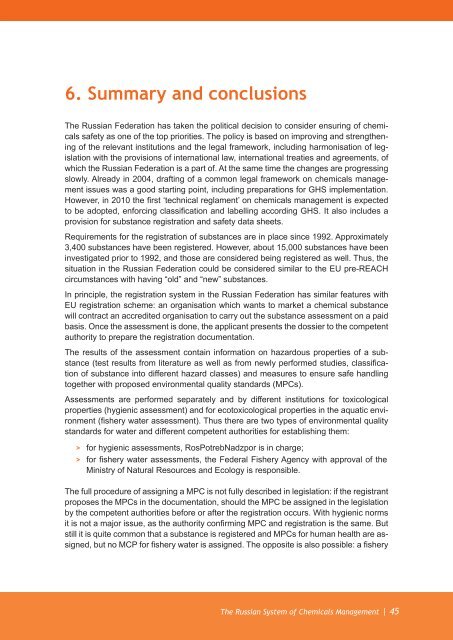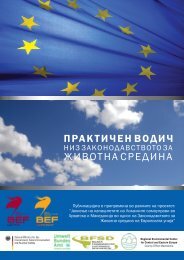The Russian system of chemicals management - Bef-de.org
The Russian system of chemicals management - Bef-de.org
The Russian system of chemicals management - Bef-de.org
You also want an ePaper? Increase the reach of your titles
YUMPU automatically turns print PDFs into web optimized ePapers that Google loves.
6. Summary and conclusions<br />
<strong>The</strong> <strong>Russian</strong> Fe<strong>de</strong>ration has taken the political <strong>de</strong>cision to consi<strong>de</strong>r ensuring <strong>of</strong> <strong>chemicals</strong><br />
safety as one <strong>of</strong> the top priorities. <strong>The</strong> policy is based on improving and strengthening<br />
<strong>of</strong> the relevant institutions and the legal framework, including harmonisation <strong>of</strong> legislation<br />
with the provisions <strong>of</strong> international law, international treaties and agreements, <strong>of</strong><br />
which the <strong>Russian</strong> Fe<strong>de</strong>ration is a part <strong>of</strong>. At the same time the changes are progressing<br />
slowly. Already in 2004, drafting <strong>of</strong> a common legal framework on <strong>chemicals</strong> <strong>management</strong><br />
issues was a good starting point, including preparations for GHS implementation.<br />
However, in 2010 the first ‘technical reglament’ on <strong>chemicals</strong> <strong>management</strong> is expected<br />
to be adopted, enforcing classification and labelling according GHS. It also inclu<strong>de</strong>s a<br />
provision for substance registration and safety data sheets.<br />
Requirements for the registration <strong>of</strong> substances are in place since 1992. Approximately<br />
3,400 substances have been registered. However, about 15,000 substances have been<br />
investigated prior to 1992, and those are consi<strong>de</strong>red being registered as well. Thus, the<br />
situation in the <strong>Russian</strong> Fe<strong>de</strong>ration could be consi<strong>de</strong>red similar to the EU pre-REACH<br />
circumstances with having “old” and “new” substances.<br />
In principle, the registration <strong>system</strong> in the <strong>Russian</strong> Fe<strong>de</strong>ration has similar features with<br />
EU registration scheme: an <strong>org</strong>anisation which wants to market a chemical substance<br />
will contract an accredited <strong>org</strong>anisation to carry out the substance assessment on a paid<br />
basis. Once the assessment is done, the applicant presents the dossier to the competent<br />
authority to prepare the registration documentation.<br />
<strong>The</strong> results <strong>of</strong> the assessment contain information on hazardous properties <strong>of</strong> a substance<br />
(test results from literature as well as from newly performed studies, classification<br />
<strong>of</strong> substance into different hazard classes) and measures to ensure safe handling<br />
together with proposed environmental quality standards (MPCs).<br />
Assessments are performed separately and by different institutions for toxicological<br />
properties (hygienic assessment) and for ecotoxicological properties in the aquatic environment<br />
(fishery water assessment). Thus there are two types <strong>of</strong> environmental quality<br />
standards for water and different competent authorities for establishing them:<br />
>><br />
>><br />
for hygienic assessments, RosPotrebNadzpor is in charge;<br />
for fishery water assessments, the Fe<strong>de</strong>ral Fishery Agency with approval <strong>of</strong> the<br />
Ministry <strong>of</strong> Natural Resources and Ecology is responsible.<br />
<strong>The</strong> full procedure <strong>of</strong> assigning a MPC is not fully <strong>de</strong>scribed in legislation: if the registrant<br />
proposes the MPCs in the documentation, should the MPC be assigned in the legislation<br />
by the competent authorities before or after the registration occurs. With hygienic norms<br />
it is not a major issue, as the authority confirming MPC and registration is the same. But<br />
still it is quite common that a substance is registered and MPCs for human health are assigned,<br />
but no MCP for fishery water is assigned. <strong>The</strong> opposite is also possible: a fishery<br />
<strong>The</strong> <strong>Russian</strong> System <strong>of</strong> Chemicals Management | 45



